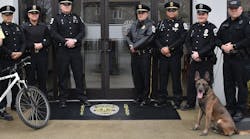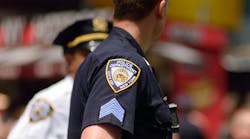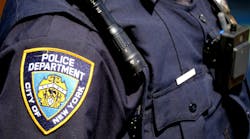On 9/11/01, I awakened to the clock’s radio alarm. It had been set for 0700 PST. I needed to get my sons up, showered, and fed before I drove them to school. I remember hearing the newscaster stating that the country was under attack. At first I think I incorporated the news into a dream. It simply couldn’t be true, but the urgency in the reporter’s voice became apparent. I woke my husband up, and he silently looked up at me with a look of disbelief and horror. We turned the television onto CNN. A picture sure does speak a thousand words, and then some. I tried to process the information, but it was impossible. My youngest son Kyle came into the living room and joined us. He asked what was happening; I couldn’t find the words to explain. I wondered if there was any explanation anyone could give a child. I was crying, Lee was crying, and Kyle was crying when my oldest son Grant came into the room. I remember Grant becoming very angry. I don’t remember when, but I called Sgt. Yancey at the Encinitas, CA sheriff’s station and let him know I was available if they needed me. I was the station’s psychiatric emergency response clinician. I don’t remember what his response was, if he even had one.
This year marks the 10thanniversary of the September 11th tragedy, and the nation still grieves. It is a date permanently etched into our memories in the same emotional way as the dates December 7, 1941 (the attack on Pearl Harbor) and November 22, 1963 (the assassination of President John F. Kennedy). Visual images, personal reflections, and a pervasive sense of grief are still prevalent in the American psyche.
The Nation Grieves
On 9/11/01 the entire country entered a state of grief even those of us who did not personally know any of the innocent victims, or those who lost their lives trying to save them. Americans also experienced personal feelings of loss; loss of safety, loss of trust, and above all, a loss of innocence.
Grief
Everyone experiences grief differently. The severity of grief, mild to extremely intense, depends upon the perceived loss the individual has suffered. The most common symptoms of grief are: shock, bewilderment, anger, feeling of despair, numbness, vivid dreams, extreme sadness, restlessness, anxiety, avoiding or clinging to memories, self-blame, and an inability to focus. The grieving process goes though specific stages; denial, anger, bargaining, depression, and finally acceptance. Failure to go through these stages can lead to chronic and debilitating grief, commonly referred to as “complicated grief”.
People deal with personal grief individually, processing it at a different pace as they attempt to cope with the most common feeling of sadness. However, nationwide grief following a disaster is not only quite public; it is more intense, and inherently stronger. Additionally, when a nation grieves the reminders are constant and everywhere.
An increase in distress around the anniversary of a traumatic event is commonly known as an "anniversary reaction". Symptoms range from mild unease and sadness, to significant feelings of profound depression and anxiety. Anniversary reactions occur because the date of the original trauma activates a traumatic memory. In a case such as the September 11, 2001 attacks, the date itself may serve as an especially strong trigger for people. It is nearly impossible for any adult who was impacted by that event to go through that day unaware of its significance. If they happen to forget the date, the media will serve as a constant reminder. The symptoms of anniversary reactions to traumatic events are the same as those of PTSD: re-experiencing symptoms, avoidance symptoms, and arousal symptoms. Other types of anniversary reactions may involve anxiety symptoms: panic attacks, phobias, and excessive worry.
The Psychological Impact of 9/11
The emotional and psychological effects of this were profound. The American Journal of Epidemiology reported that over 95% of the evacuees of the World Trade displayed at least one symptom of Post Traumatic Stress Disorder. 15% of survivors screened positive for PTSD three years after the disaster. A research study by the Century Foundation following the 9/11 terrorist attack found that 14% of all New York City residents exhibited symptoms associated with diagnoses of PTSD, depression, or both. Even more significantly, 18% of children living in NYC experienced severe PTSD reactions in the months following the attacks; 66% had moderate reactions.
The psychological effect of the attacks extended far beyond the New York area. In a nationwide survey conducted in the days following the attacks, 90% of adults reported that they were experiencing at least one symptom of mental stress. Unfortunately, the nation’s mental health community was ill prepared to assist in easing a nation's psychological strain. Additionally, many individuals who could have benefited from mental health treatment did not seek it out. The worst news is that he researchers concluded that our mental health system still remains largely unprepared for the psychological consequences of national disasters.
Trying to Make Sense of the Senseless
There are four emotionally positive lessons that all Americans should have learned from that tragic day.
- Heroes can be anyone; police officers, firefighters, flight attendants, soldiers, co-workers, volunteers, or even strangers on the street. Americans are generous with their courage; we are surrounded by heroes. Anyone can be a hero.
- Nationally, we are at our best when times are at their worst. Americans came together in this time of need.
- Life is fragile; it can be lost in a heartbeat. What we have experienced as a consequence of 9/11 is to remember to live each day fully.
- Community involvement and service are essential components of our American society. September 11 has been designated a National Day of Service and Remembrance. All Americans are encouraged to participate in service projects in their community in honor of 9/11.
To All the First Responders of 9/11
One of the first lessons I learned when I started riding as a psychiatric nurse with law enforcement is that first responders run into dangerous situations, while everyone else runs out. 343 firefighters and 72 federal, state and local law enforcement officers died doing exactly that 10 years ago.
I have worked with several survivors of the worst terrorist attack ever on U.S. soil. They were all grieving. They were also all grateful to all the first responders who gave their lives to protect them/their loved ones, as well as to all the first responders who lived to help them.
The following open letter was written anonymously, but signed by People of the United States of America.
Dear Fellow American:
“Thank you for your efforts. September 11, 2001 was a difficult day for this country. We have had many difficult days in our history and most of them have made this country stronger and more resilient. These United States are built on strength, wisdom and a burning desire for freedom.
We thank the first minute man that sacrificed his life to foster an idea and new way of life. To the unfortunates that fought against their brothers and fathers during the War Between the States, we feel your pain. To those that took to the skies and ships following the attack at Pearl Harbor, we are thankful. To those that have gone forward into conflicts amidst ongoing debate. While many argued the merits, you did not hesitate. To the many that have served in times of peace, your courage has touched us. To those who help defend the ideals and principles of liberty and justice, we are inspired. Lastly, to those that gave their lives in war or conflict, we honor your ultimate sacrifice. You have awed us.
We are a nation of many. We are of many religions, backgrounds and colors. We have different wants, different goals and different views. Whatever we are and whatever we may achieve, we could not do it without you. We humbly go forth and strive to keep this country free to follow the ideals that you died to protect. We are a grateful nation.”
Sincerely yours,
“People of the United States of America”
About The Author:
Pamela Kulbarsh, RN, BSW has been a psychiatric nurse for over 25 years. She has worked with law enforcement in crisis intervention for the past ten years. She has worked in patrol with officers and deputies as a member of San Diego's Psychiatric Emergency Response Team (PERT) and at the Pima County Detention Center in Tucson. Pam has been a frequent guest speaker related to psychiatric emergencies and has published articles in both law enforcement and nursing magazines.


